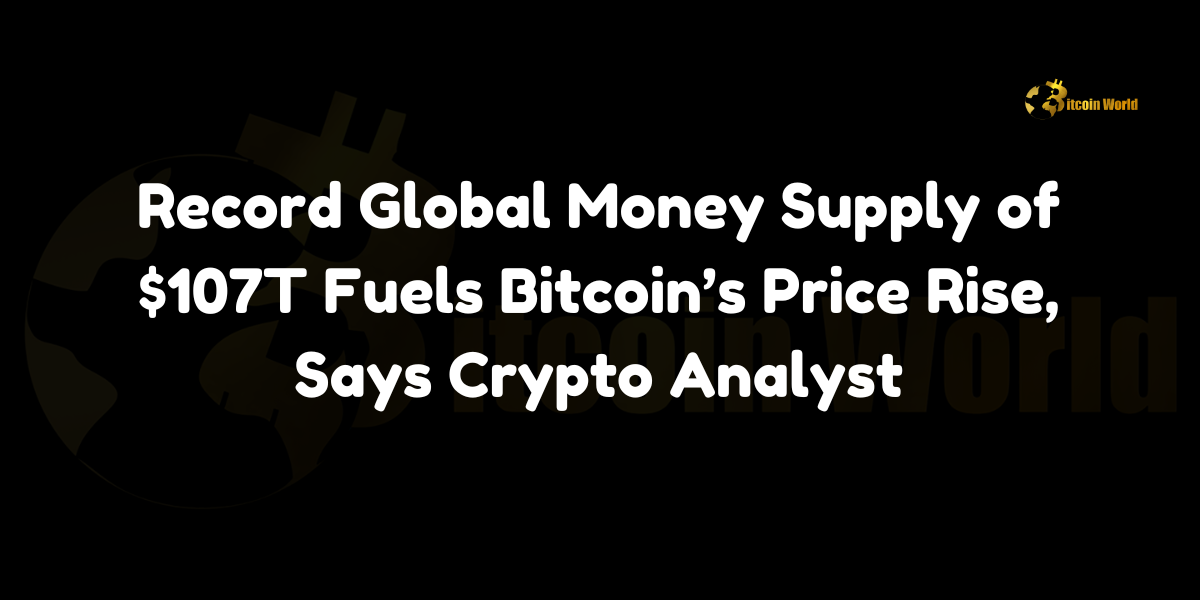Record Global Money Supply of $107T Fuels Bitcoin’s Price Rise, Says Crypto Analyst
According to Jamie Coutts, Chief Crypto Analyst at Real Vision, the global money supply has reached a record high of approximately $107 trillion, which is playing a significant role in driving up Bitcoin (BTC) prices. In a recent post on X, Coutts explained that an increase in the money supply tends to weaken the purchasing power of fiat currencies, leading to inflation. As fiat currencies lose value, more capital flows into assets like Bitcoin, which are perceived as better at retaining value and acting as a hedge against inflation.
Coutts also emphasized the importance of understanding the liquidity cycle in predicting when new capital might flow into assets like Bitcoin, potentially spurring further investment and boosting prices even higher.
The Impact of Global Money Supply on Bitcoin Prices
Record Global Money Supply of $107 Trillion
As global central banks continue to inject liquidity into the economy, the total global money supply has surged to a record $107 trillion. This rapid expansion of the money supply has several implications for the global economy, especially when it comes to inflation and asset prices.
In the context of Bitcoin, the increase in the money supply diminishes the purchasing power of traditional currencies like the U.S. dollar, euro, and yen. This decline in purchasing power, often referred to as inflation, prompts investors to seek out assets that are perceived to hold their value over time, such as Bitcoin, gold, and real estate.
Inflation and Capital Flow into Bitcoin
As inflation erodes the value of fiat currencies, investors tend to move capital into assets that are considered inflation hedges. Bitcoin has increasingly been viewed as a store of value and a hedge against inflation due to its fixed supply of 21 million BTC. Unlike fiat currencies, which can be printed in unlimited amounts, Bitcoin’s supply is finite, making it a scarce asset that can retain value in an inflationary environment.
Coutts noted that as inflation rises, investors become more inclined to allocate capital to Bitcoin, driving up demand and, consequently, the price. This trend was evident during the COVID-19 pandemic, when massive stimulus measures and an expanding money supply contributed to Bitcoin’s dramatic price rise.
Understanding the Liquidity Cycle and Its Role in Bitcoin’s Price
The Liquidity Cycle and Asset Prices
Coutts highlighted the importance of understanding the liquidity cycle—the flow of money into and out of financial markets—in predicting price movements for assets like Bitcoin. When liquidity is abundant, and central banks are injecting money into the economy, capital tends to flow into risk assets such as stocks and cryptocurrencies.
Conversely, when liquidity is tightened, either through interest rate hikes or quantitative tightening, capital can flow out of risk assets, leading to price declines. Understanding these liquidity dynamics is crucial for anticipating when new capital might flow into Bitcoin, potentially sparking a price rally.
Capital Flow into Bitcoin
As the global money supply continues to grow, many investors see Bitcoin as an attractive asset to protect against the devaluation of fiat currencies. Coutts believes that as more capital flows into Bitcoin during periods of excess liquidity, the asset will experience increased demand, pushing its price higher.
Investors and traders who can anticipate shifts in liquidity cycles may be able to position themselves advantageously, capitalizing on Bitcoin’s price appreciation as global liquidity rises.
Bitcoin’s Role as a Store of Value in an Inflationary Environment
Bitcoin vs. Fiat Currencies
Bitcoin’s fixed supply makes it an attractive store of value compared to fiat currencies, which can be subject to monetary expansion by central banks. As inflation increases and fiat currencies lose value, Bitcoin’s scarcity and decentralized nature have positioned it as a hedge against the devaluation of money.
While traditional stores of value like gold have long served as a hedge against inflation, Bitcoin has emerged as a digital alternative, appealing to younger generations and those seeking exposure to digital assets. Bitcoin’s increasing adoption as a reserve asset by institutions further solidifies its role as a hedge against inflation.
Bitcoin’s Price Performance Amid Inflationary Pressures
Bitcoin’s price has historically responded well during periods of high inflation and monetary expansion. The influx of liquidity from central banks has often coincided with significant price increases in Bitcoin, as investors seek safe havens to preserve their wealth.
The ongoing expansion of the global money supply, combined with the expectation of further inflation, supports the case for continued capital flow into Bitcoin, potentially driving prices higher in the future.
Conclusion
The record $107 trillion global money supply is playing a key role in driving Bitcoin’s price rise, as noted by Jamie Coutts, Chief Crypto Analyst at Real Vision. As inflation weakens the purchasing power of fiat currencies, more capital is flowing into Bitcoin, which is increasingly viewed as a hedge against inflation and a store of value.
Coutts also emphasized the importance of understanding the liquidity cycle to predict when new capital might flow into assets like Bitcoin, potentially triggering further investment and price appreciation. As global money supply continues to rise, Bitcoin’s status as a scarce digital asset could attract more capital, driving its price even higher.
To learn more about Bitcoin’s role in inflationary environments and the impact of liquidity cycles on asset prices, explore our latest news article, where we analyze the key factors influencing the future of Bitcoin and global financial markets.
Disclaimer: The information provided is not trading advice, Bitcoinworld.co.in holds no liability for any investments made based on the information provided on this page. We strongly recommend independent research and/or consultation with a qualified professional before making any investment decisions.




